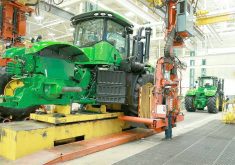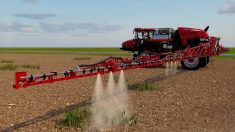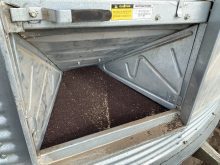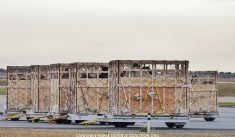Now if XL had not been allowed to buy Lakeside, and another buyer had been found, would Moose Jaw have closed anyway?
Regular readers of this column will know I wasn’t too enthused about the sale of Lakeside Packers to XL Beef. The Competition Bureau decided that Canadian farmers would be well enough served by having two companies controlling 95 per cent of beef packing in Canada. It blessed the sale with the proviso that it would “watch” and if competition wasn’t sufficient in the future it would have to act. (What the bureau could possibly do a few years down the road, other than wring its hands, is beyond me.)
Read Also

Farm equipment sales sector sees significant structural changes
Farming equipment sales have been declining for a number of years now, and one industry professional believes structural changes in the industry are needed to curb that trend.
Readers will also know that I lambasted some of the groups claiming to represent cattle producers for their unwillingness to oppose the consolidation in the industry. One such representative defended this by saying that the packers (XL and Cargill) write good cheques, so why would we criticize them? (They may be good but they are so darn small!)
The columns I wrote about this brought me probably the largest response since I began writing, more than 700 columns ago. While some of it was negative, most was positive. There are a lot of angry cattle farmers out there. Angry at governments, and angry at the leadership of farm organizations.
One large cow-calf producer who phoned me surprised me a bit when he said that now that XL was going to own Lakeside Packers, it would soon close XL Beef in Moose Jaw, and likely its plant in Calgary. Even for someone as jaded as me, that seemed a bit much. “Of course,” he said. “Lakeside is operating below capacity, so why would they keep the other two plants open?”
Geez, what a cynic, I thought. But, of course, it turns out he was right. XL announced on April 24 that it is “temporarily” shutting the Moose Jaw plant down, with a likely resumption of operations in September. One employee was less optimistic, saying the September reopening was more a wish than a likelihood.
The Western Producer reported the reactions of the Canadian Cattlemen’s Association and the Saskatchewan Stock Growers Association. Neither appeared upset with Nilsson Bros., owners of XL. CCA president Brad Wildeman said, “If there’s nothing to slaughter, you can’t expect to keep it open.” SSGA president Ed Bothner was equally sympathetic. “It’s out of their control.” Even the head of the union at XL bought the argument. “Who would think in Saskatchewan we’d have no cows?”
SHORT OF CATTLE?
Since the plant at Brooks has been operating at about 75 per cent capacity, and Moose Jaw has had a reduced kill lately, the logical assumption is there just aren’t enough cattle to go around. Of course, during BSE, with the border closed, prices were low because there wasn’t enough slaughter capacity in Canada to kill all the animals available. Now, that the border is open (at least for now) cattle are again heading to the U. S. and Canadian plants are short.
The thing about this is that cattle are being shipped to the U. S. In other words, there are more cattle available to kill, but someone else, in the U. S. is willing to pay more for them than the Canadian plants. So there is something to slaughter, and it isn’t out of XL’s control. Just pay more and you’ll have more cattle. And the cow numbers in Saskatchewan are down, alright, but only a bit over two per cent from six months ago. There are still cows in Saskatchewan.
And, if there are fewer cattle overall, it is because farmers stopped raising them, and began to sell off their cows because there was no money in it. Let’s face it. The packers made a killing during BSE. If they had passed more of that back to the farmer, there would be more cows now, and no one would be talking about shortages of animals. So the packers are victims of a problem of their own making.
Now, I know that the market doesn’t work that way. The packers will never pay more than they have to, because they are business people, not charitable institutions, and they mainly think short term. To get money out of them, we need to have competition. That is the nature of our economic system. Rob Leslie, senior analyst at Canfax, knows that. The Western Producer article quotes him saying the closure will mean lower prices for feeders and fat cattle. “We’re reducing capacity and the plants don’t have to go out there and be quite as aggressive on their bids to procure cattle.”
Of course, that will reduce cattle producers’ profitability even more, leading to fewer of them raising cows. Which may lead to more plant closures, or fewer reopenings…
Now if XL had not been allowed to buy Lakeside, and another buyer had been found, would Moose Jaw have closed anyway? Maybe. Or maybe not, since it is expected there will be more cattle available in the fall.
So tell me again why the cattle organizations figure consolidation in the packing industry is okay. I haven’t had a good laugh in quite a while.
Paul Beingessner farms and writes from Truax, Saskatchewan.














